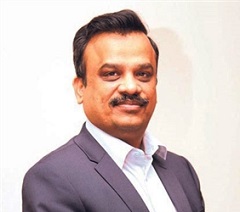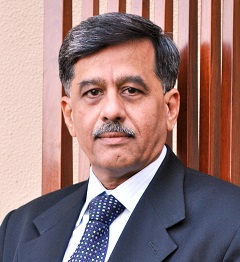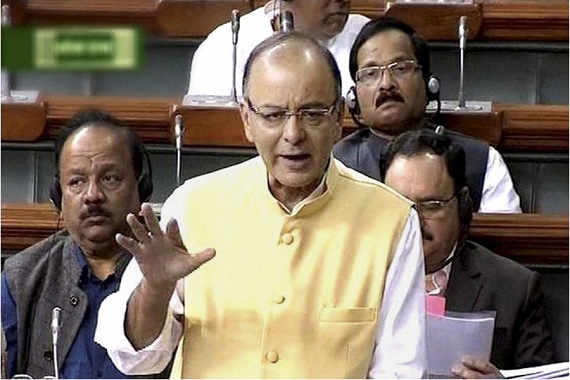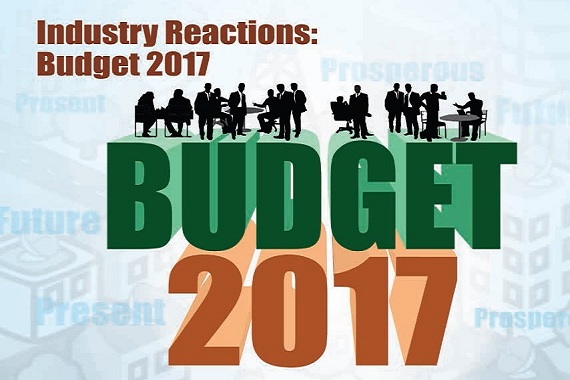The much awaited Budget 2017-18 is out now. Mobility Industry is one of the segments in the industry which has been highly sensitive to the budget. This budget, second from the new government at the central government kept its focus up on Digitization, Make in India and Smart Cities, which will continue to push the mobility industry. The budget meets most of the expectation from the industry doyens, but there are a few concerns. Here are some comments from the industry stalwarts on the current budget.
 Mr. Jay Chen, CEO, Huawei India.
Mr. Jay Chen, CEO, Huawei India.
“We at Huawei Telecommunications India are pleased to note that the current budget strongly supports the progressive vision of a Digital India set by Hon’ble Government. The allocation of INR 10,000 crore towards BharatNet will give an overall boost to broadband connectivity in the country. The success of the BHIM app and announcements related to its promotion, Aadhar based swipe machines, and tax exemption to those who use Aadhar based POS machines, will all help accelerate acceptance of digital payments. Furthermore, initiatives like ‘Digital Village’ and ‘Digi-Gaun’ will significantly extend the benefits of digitization to rural India and contribute to a Better Connected India”
The industry feels, on the overall, it is pragmatic budget that is set boost sartups and Make in India. This budget is set to make Make in India a reality.
 Mr. Arvind R Vohra, Country CEO & MD, Gionee India
Mr. Arvind R Vohra, Country CEO & MD, Gionee India
“We are positive, that the Government’s increased allocation and incentives in schemes like M-SIPS and EDF will provide the necessary push to the mobile and internet manufacturing economy . Also the allocation of INR 10,000 crore in BharatNet provides the much needed boost for the penetration of Digital India into the rural segment, and for strengthening the consumptions of smartphones”
Mr Akshay Dhoot, Head, Technology and Innovation, Videocon
“We congratulate the Central Government for presenting a growth-conducive budget. The overall announcements seem to give a cohesive push to the holistic economic growth. We welcome the initiatives that will give further boost to Make in India in order to make our country a hub of electronic and tech manufacturing. This has been taken care of with announcements like incentivizing local electronic manufacturing up to Rs. 745 crore by enhancing special policies like Modified Special Incentive Package Scheme (MSIPS) and Electronic Development Fund (EDF). This move would definitely give more sops to domestic mobile handset makers. India is one of the fastest growing mobile markets in the world and it would further get boost from the newly formed trade infra export scheme.”
 Mr Sudhir Kumar, CEO, itel Mobile India
Mr Sudhir Kumar, CEO, itel Mobile India
“The Union Budget 2017 carries significant prospects for manufacturing brands. The FM has included provisions meant to boost electronic manufacturing by promoting MSIPS and EDF. Such policies would further receive funds worth INR 745 crores in FY18, hence, promoting indigenous manufacturers and attracting innovation and technology prowess engineered by foreign countries. And while the manufacturing sector celebrates policy changes, we further appreciate the streamlined delivery of these products, via the GST bill. These announcements are further in sync with the overall emphasis on transitioning India into a digital economy, empowered with fast Internet access, cyber-security and access to smartphones. It is heartening to see the union budget for FY-2017 support the right to progress by shifting the focus back on to rural economy and agriculture; which truly resonates with our brand proposition. The provisions put forth in the budget are going to improve the buying capacity, digital lifestyles and affluence of the rural India and we at itel, welcome these changes and look forward to the promising year ahead.”
Mr. Kuldeep Malik, Country head – Corporate Sales International, MediaTek India 
“We were expecting the Financial Budget 2017 to offer incentives to start inflow towards design led manufacturing in place of assembly led manufacturing ecosystem. However, it seems like the government is not yet convinced towards adopting multiple layered incentives for localization, while increasing the duties on CBU (Completely built Units). Overall based on the information available from the budget the impact of the policies seem to be neutral for mobile/tablet industry, at best.
There has been a 2% increase in duties levied on import of PCBA in India, which will still reflect only on one part of the manufacturing cycle with focus on assembly of mobile handsets. On the other hand, providing attractive incentives for localization of design and R&D capabilities would have bolstered the ‘Make in India’ initiative, and driven more handset makers to introduce design led manufacturing in India.
Post demonetization government seems to be totally convinced towards digital payment adoption. There is one key development towards ‘Digital India’ program, where Government has decided to waive off all duties (SAD/CVD, BCD) levied on mPOS systems. This in turn will make the POS devices cheaper, leading to greater adoption of such devices even at the grass root level in the coming years and hence helping drive forward the mobile payments ecosystem. Considering the adoption of Aadhar based payment, government has also waived off duties from components such as IRIS scanner and fingerprint readers.”
 Mr. Rajiv Srivastava, MD, HP India:
Mr. Rajiv Srivastava, MD, HP India:
“The Union Budget 2017-18 is extremely positive for the common man, farmers, small and medium businesses and would drive significant growth in Indian economy. Government’s commitment to make taxation rate reasonable, tax administration fair and expand the tax base is the step taken in the right direction. The tax relief given by the Government for the middle class tax payers will definitely boost the purchasing power, thereby aiding the overall growth of the economy. The major tax relief given to the MSMEs and SMEs with an annual turnover of Rs. 50 crores, would enable them to invest in job creation, increase capital expenditure and explore their digital journey.
The strong emphasis laid on technology in almost all the development areas in the budget reaffirms that technology has been at the forefront of India’s recent economic growth and digital transformation. It has been recognized as an important enabler across initiatives ranging from agriculture to skill development to manufacturing and infrastructural development. The Government’s focus on making India a digital payment economy will definitely help companies like HP to contribute in technology adoption in rural and semi-urban areas, thereby bringing the Digital India’ vision closer to reality. We also welcome the Finance Minister’s commitment to introduce and implement Goods and Services Tax (GST) as per schedule and start GST awareness programme from April 1, 2017 for all stakeholders.”
 Mr Arjun Bajaj, CEO and Founder, Daiwa
Mr Arjun Bajaj, CEO and Founder, Daiwa
We thank the Indian government for including such incentives in the Union Budget. The announcement of INR 745 Cr for electronic manufacturing in the country is further going to attract global innovators to make India a hub for manufacturing tech and electronic products. The same, in addition to the GST Bill, meant at streamlining taxes and costs, is surely going to boost up the morale of the electronic manufacturing industries.
However, the problem still does not get solved as we continue to import the material used in the manufacturing from neighboring countries, such as China. The government must focus on bringing in the manufacturers of raw materials, i.e. different types of components, parts, open cell etc. in order to truly achieve the dream of MAKE in INDIA.
Mr Avneet Singh Marwah, Director and CEO of Super Plastronics Pvt Ltd (Kodak TV India) 
“Union budget 2017 has taken a two pronged approach of addressing issues being faced by the rural economy and the corporate sector. First, the allocation of INR 23,000cr for the Pradhan Mantri Awas Yojana and INR 48,000 cr for MGNREGA will reenergize the rural economy with renewed investments and confidence. Second, the relief in the corporate tax structure for MSMEs (annual turnover less than INR 50 crore) reduced to 25% and individual tax payers (-5%) are small steps in the right direction. Third, reinforcing its commitment to the ‘Make in India’ initiative, the budget has earmarked INR 750 cr specifically to encourage domestic companies involved in electronic manufacturing. Fourth, the political funding reforms announced today are commendable. It’s a massive step in the right direction by bringing in compliance in the otherwise chaotic political funding eco-system. The only missing link in the budget was the lack of clarity on the GST rollout timelines and implementation process.”
Mr Rajiv Bhalla, Managing Director, Barco India

“We appreciate the deep-rooted changes introduced in the Union Budget 2017. The budget further reflects the commitments of the Indian Government to truly promote digitalization in the country. This includes allocating INR 10,000 crore for Bharat Net Project which is dedicated to extending high-speed broadband, Wi-Fi hotspots and Fiber Optic network in India, especially to the rural landscapes, Gram Panchayats and more. Manufacturers of tech and electronic products will also receive a boost, following the announcement of Rs 745 crore funds allocation for the same. When viewed in the light of the upcoming GST bill, the entire budget caters to the unique needs of promoting digitalization in an emerging market. Besides, the boost to digitalization is well supported with a host of infrastructural overhauls as well. We appreciate an allocation of INR 241,387 crores for transforming the transportation sector, including ships, rails, and roads. Railways further have a development expenditure of INR 131,000 crores, out of which, the government will be providing INR 55,000 crores. These changes are going to have a transformational effect, positively influencing the advent of Smart Cities in India.”
Kenny Ye, GM–Overseas Business, Alibaba Mobile Business Group
 “It is a budget for the masses: Union Budget 2017-18 is a big relief for the common masses – from reduction in personal income tax to sops for affordable housing – the Finance Minister has announced various measures to benefit farmers and weaker sections of the society. On the corporate side, abolishing of FIPB is a bold step and further liberalization of FDI policy will cheer foreign investors. While last year’s auctions removed spectrum scarcity in the country, expansion of Bharat Net project will ensure high-speed broadband to 1.5 lakh gram panchayats via Wi-Fi. With increasing smartphone penetration and push for high-speed broadband connectivity in rural areas, a massive digital revolution is imminent in India. Last, reduction of corporate tax for MSMEs is a welcome step but larger Indian conglomerates looking to compete with global peers will continue to find the tax rate challenging.”
“It is a budget for the masses: Union Budget 2017-18 is a big relief for the common masses – from reduction in personal income tax to sops for affordable housing – the Finance Minister has announced various measures to benefit farmers and weaker sections of the society. On the corporate side, abolishing of FIPB is a bold step and further liberalization of FDI policy will cheer foreign investors. While last year’s auctions removed spectrum scarcity in the country, expansion of Bharat Net project will ensure high-speed broadband to 1.5 lakh gram panchayats via Wi-Fi. With increasing smartphone penetration and push for high-speed broadband connectivity in rural areas, a massive digital revolution is imminent in India. Last, reduction of corporate tax for MSMEs is a welcome step but larger Indian conglomerates looking to compete with global peers will continue to find the tax rate challenging.”
 Mr Sudip De, Director, Doel International Pvt Ltd
Mr Sudip De, Director, Doel International Pvt Ltd
“We appreciate the announcements made in Union Budget 2017. The budget is an optimistic step by the government for all the industries, ranging from agriculture, infrastructure to corporate sectors.
Post demonetization, we were expecting a few initiatives to address the concerns faced by the common man by launching BHIM app and introducing Aadhar smart cards will positively help in digital transformation and driving India towards cashless economy. Thus, leading to:
Greater transparency
Increased consistency
Higher GDP growth in the economy”
Mr Sanjay Joshi, Country Manager at Edimax India
“Edimax appreciates and welcomes the substantial Union Budget 2017 which has shown prodigious intent in keeping up the momentum of Make in India and Digital India missions. It will encourage people to adopt electronic mode of payments which lead to increased digitization and cashfree economy with inordinate transparency. Reduction in corporate taxes for MSMEs will bring ease of doing business and generate higher GDP in the economy.
A startling step taken by the government to contribute INR 10 lakh crore for BharatNet projects will strengthen the digital infrastructure in the rural areas. In addition, introducing Computer Emergency Response Team (CERT) will certainly give encouragement to people who previously were scared of digital payments. All these major steps will help in develop a highly connected India.”
Ms. Ambika Sharma – Founder & MD, Pulp Strategy Communications
“The latest budget announcement holds great promise. I am particularly enthused by the hike in capital allocation for women skill development initiatives to INR 1.84 lakh crore for the 2017-18 fiscal year. This move will empower women across the country and help them in becoming active contributors in the country’s growth. The allocation of INR 10,000 crore for the BharatNet project is also promising, as it will bring high-speed internet connectivity to rural citizens in nearly 150,000 gram panchayats through Wi-Fi hotspots. With nearly 70% of the country’s population living in rural and semi-urban geographies, the move will give the vision of a ‘Digital India’ a big boost.
On the business side, the reduction of corporate tax for MSMEs with annual turnover up to INR 50 crore to 25% is a very welcome move which is expected to benefit nearly 96% businesses in the industry. Given that corporate tax is one of the major expenses for the country’s MSMEs, the cut in tax rates will promote greater growth within the sector and will allow Indian businesses to become more competitive globally. Increasing the period for profit-linked deductions to three years out of seven years as against five years is also extremely positive news for the country’s entrepreneurial landscape. Since start-ups often do not generate any profits for the first few years of their operations, increasing the consideration period to seven years will benefit more start-ups and promote entrepreneurship across the country. The setting up of Payment Regulatory Board by RBI to replace BPSS (Board for Regulation and Supervision of Payment and Settlement Systems) as the regulator of electronic payments is also a promising development in the quest to become a less-cash and digital-first economy.”
 Mr Abhesh Verma, COO, nexGTV
Mr Abhesh Verma, COO, nexGTV
“I welcome the budget and appreciate the clear commitment shown by the government towards fueling the growth of digital adaptation by focusing on underlying infrastructure. This is reflected in the availability of more spectrums and 10,000 crore worth of budget allocation for fiber optic laying beyond the already laid 155,000 km. The availability of bandwidth will help Indians adapt to the digital lifestyle and thus, will help in the growth of the entire ecosystem. Additionally, the rebate in tax for people, especially the ones at the bottom of the pyramid will increase their in-hand disposable income a part which will also be spent on mobility, data and entertainment, further working for the benefit of the OTT players.”
 Mr Prabhu Srinivasan, Chief Strategy Officer, Intelenet Global Services
Mr Prabhu Srinivasan, Chief Strategy Officer, Intelenet Global Services
“We perceive this Union Budget 2017-18 to be one that will bridge gaps, in the country’s efforts to enhance its growth momentum. While certain aspects of the budget, such as the thrust toward digitization and skill India are indeed well-received, we feel that there should have been a dedicated focus on corporate tax and capital gains exemptions, to boost business growth amidst uncertain and volatile global economic conditions.
The addressal of MAT is a step in the right direction, with the current amendment to increase the tenure for usability of refunds from the current 10 years to 15 years, while laying emphasis on the eventual abolishment of this tax type.
The ongoing move toward GST too is a commendable effort, and we await the clarity promised from GST council on the move toward implementation.
We also welcome the move to improve the skilling of youth, as the next wave of business evolution will require an enhanced skillset, to meet the needs of a globalized and highly competitive business environment.
From the personal tax perspective, we expect that the reduction in the lowest tax slab from 10% to 5% for individuals in the tax bracket Rs 2.5 to 5 lakh, will boost employee satisfaction. Our employees can therefore enjoy higher ‘take-home’ salaries which will in some form ease the pressure on companies.”
Ajay Laddha, Co-Founder, YMS Mobitech Pvt Ltd 
The Union Budget has outlined all the right steps in line with the government’s central agenda of Transform, Energise and Clean India. The lower corporate tax announced will help small businesses become more competitive in the global market while reduction in personal income tax is a step in the right direction to boost the consumption cycle. Increasing number of years from 5 to 7 for tax holiday for startups is also a welcome step. Preempting spate of cashless transactions in the days ahead, announcement of a new payment regulatory board will help in realizing govt’s dream of a Digital Economy. Also, curb on cash transactions of over 3 lakhs will help to check the parallel economy.
Mr Sunil Khanna, President & MD – India, Vertiv
“We believe that the government has focused on creating an inclusive budget for a transparently governed country. It’s refreshing to see the government calling out digital economy as one of the major areas of focus as this will bring in a more transparent administration, enhancing finances for everyone. The move to incentivize merchants with rebates will accelerate the adoption of mobile and digital payment systems in India thus increasing the scope of financial services to the underbanked. Personally believe that this budget holds a lot of promise for skilling the youth in the country. This is something that various industry bodies including the CII, have always advocated. The fulfillment of the Bharat Net scheme along with schemes tailored for the MSME sector will help contribute to a viable and healthy start-up ecosystem.
The provision to support NABARD in digitizing 63,000 primary agro-operatives is a healthy move in order to penetrate rural sectors to achieve its goal of a Digital India. Considering the power deficit situation in the country, the proposal to feed 7000 railway stations with solar energy will help in reducing dependence on conventional energy sources. The almost 1/3rd increase in resource allocation towards Integrated Power Development Scheme and Deen Dayal Upadhyaya Gram Jyoti Yojna (from INR 7874 to 10635 crores) is also a step in the positive direction.”
Mr J.A. Chowdary, Advisor IT & Special Chief Secretary to Chief Minister, Government of Andhra Pradesh
 “The transformative potential of Union Budget 2017 is enormous. Thanks to the initiatives proposed in the Budget, next-generation Knowledge Service Hubs such as Fintech Valley, Andhra Pradesh can emerge as growth magnets and growth drivers for the Indian economy. The thrust provided to digital transactions will propel the Fintech sector forward; when combined with other initiatives that support tax compliance, digital infrastructure or even rural electrification – the overall outcomes for India can be transformative, to say the least. I am confident that the next-generation knowledge service hubs will also become the hubs for ideas and innovation, while attracting skills, capital and academic institutions documenting, researching, furthering and spreading the knowledge that is created. For us at Fintech Valley, Vizag, it is inspiring to contribute to the realization of such a future, which we are committed to!”
“The transformative potential of Union Budget 2017 is enormous. Thanks to the initiatives proposed in the Budget, next-generation Knowledge Service Hubs such as Fintech Valley, Andhra Pradesh can emerge as growth magnets and growth drivers for the Indian economy. The thrust provided to digital transactions will propel the Fintech sector forward; when combined with other initiatives that support tax compliance, digital infrastructure or even rural electrification – the overall outcomes for India can be transformative, to say the least. I am confident that the next-generation knowledge service hubs will also become the hubs for ideas and innovation, while attracting skills, capital and academic institutions documenting, researching, furthering and spreading the knowledge that is created. For us at Fintech Valley, Vizag, it is inspiring to contribute to the realization of such a future, which we are committed to!”
 Mr Vijay Shekhar Sharma, Founder & CEO – Paytm
Mr Vijay Shekhar Sharma, Founder & CEO – Paytm
“It is a digital economy budget. Government has pushed the digital theme in every area of the budget. Every person from a small shop owner to consumer is pushed towards the digital economy. Tax benefits and incentives to use digital payments and extend loans based on a digital footprint will create a larger merchant ecosystem for digital payments. Incentives for labor-intensive sectors including housing, farming and dairy will help SMEs to create new jobs. Focus and attention on bank NPAs, as well as increasing bank capitalization is a great step towards strengthening the financial system of the country. Finally, the income tax rate changes will encourage more people to report their incomes and create a larger tax net for the country. Overall, it is a great budget that will encourage people to move to the formal economy and derive benefits.”
Mr Tomas Pavel, CMO, Home Credit India Pvt Ltd
“The Finance Minister presented a carefully detailed plan to improve people’s spending power and also focused on the need of small traders and farmers. It is heartening to note that the Finance Minister has offered the biggest tax break to the lowest salaried bracket giving them more money in hand. The push towards digitalization of payments and formalizing the credit market is a welcome step which will lead to more people coming under the legitimate financial system.”
Mr Pulkit Punj, Director at AnG India Ltd
“The Union Budget 2017-18 is favorable for the technology sector, small and medium sized enterprises significantly contributing to grow the Indian economy. The Government’s undertaking to make tax rates reasonable and expand tax base will be a boost for our businesses. The major tax relief given to the MSMEs and SMEs with an annual turnover of INR 50 crores, would enable them to invest in new technology, R&D and explore their digital journey. The ‘Make in India’ initiative will also bring in growth opportunities for local Industries and increase industry output. A considerable emphasis laid on technology in all the development areas and sectors assures us that technology will be at the forefront for India’s economic growth and digital transformation. This budget, has given a momentous push to infrastructure which will also act as an integrated approach to improve safety for the citizens.”
“Mobiles manufacturing in India deserves much more” CMR

Finance Minister Shri Arun Jaitley while presenting Union Budget for 2017-18 announced a slew of measures to push important cogs of the economy. Electronics manufacturing in general and Mobile Phones in particular have become important contributors to the economy in recent years. Mobile phones have in fact gone beyond and are now being seen as the hub of the Digital Nation that India is in making.
As per CMR estimates, in 2017, of the 270 million (27 Cr) mobile handsets to be shipped, 200 million (20 Cr) will be made out of India. Also from the allocated INR 745 Cr incentives for electronics manufacturing in India, around 70% is likely to go to Mobile Handset manufacturing.
This means, as per the all time high allocation, government will incentivize INR 26% handset to be made out of India. Against this, at an average selling price of INR 5138, government collects revenues of INR 617 per handset by way of various duties and taxes. That is a whopping 24 times of the incentive allocated per handset.
CMR completely appreciates the fact that this is an all time high allocation and a defined one for the first time that brings in more clarity about what one can expect as incentives. However, the kind of fillip everybody wants for the mobile handset industry looking at the potential in this category of electronics, the incentive could have been more exciting and encouraging one.
Commenting on the incentives announced, Faisal Kawoosa, Principal Analyst for Telecom and ESDM at CMR, said, “Any incentive is welcome underlining the intent of the government, and the all time high allocation is a great indicator in that direction. However, looking at the potential as well as the success story the mobile phones have exhibited in very short span of time in India, an extra mile effort would have been ‘icing on the cake’.”




